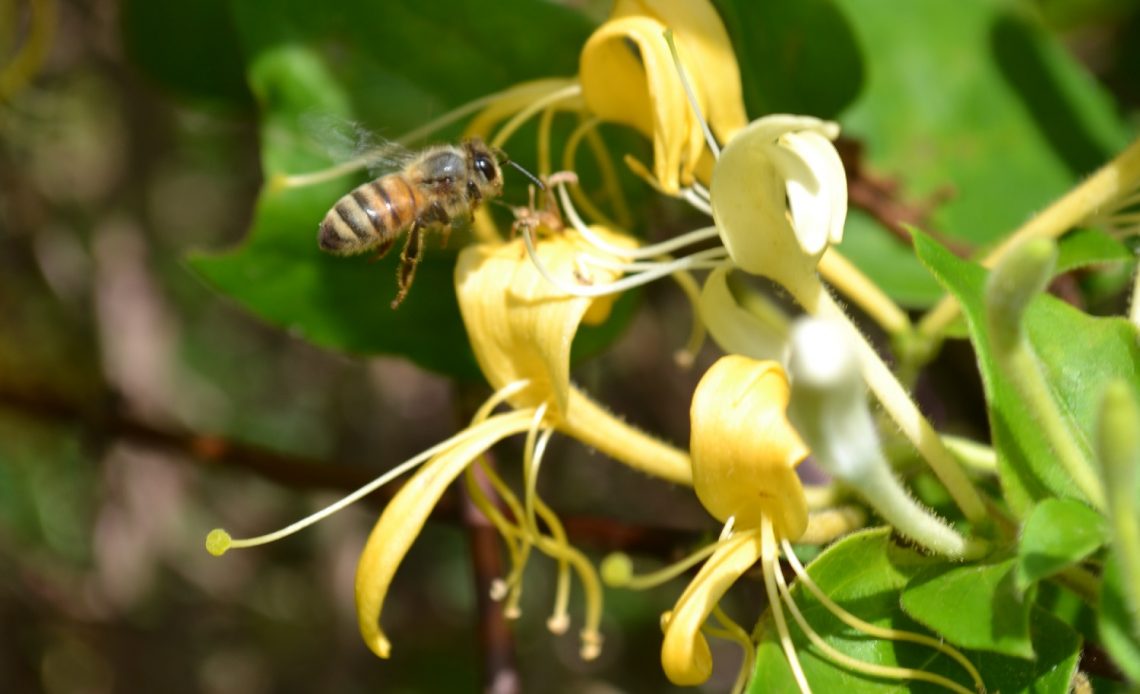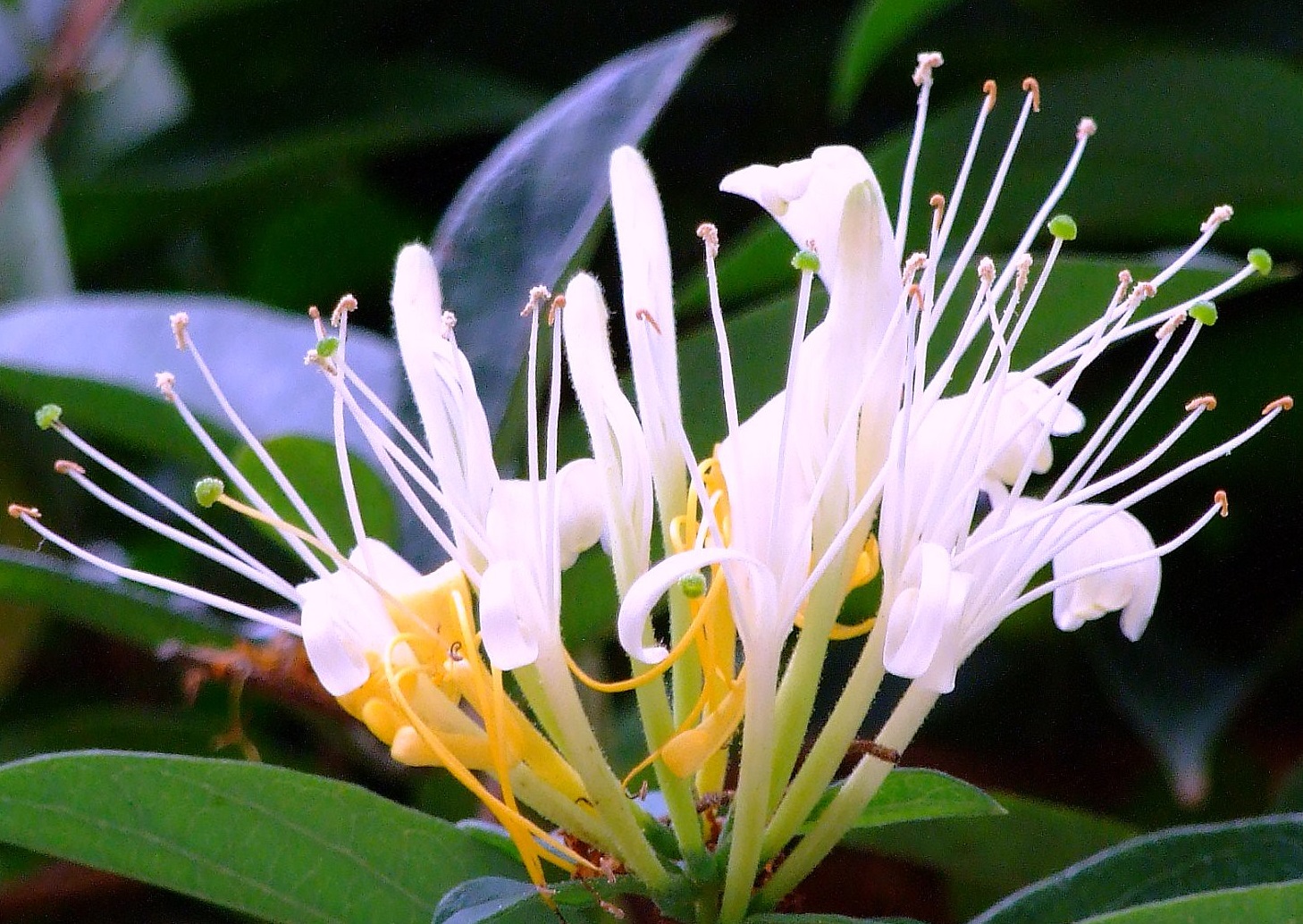

We’re here to help! Wild Yards is a completely free website that is 100% dedicated to helping you create a wildlife-friendly, sustainable yard. Read more
WildYards is reader-supported. When you buy a product through a link on our site, we may earn a comission. Every product is independently selected by our (obsessive) editors and our reviews are unbiased and objective. Read more about our mission or our privacy policy.
Featuring a multitude of small, trumpet-shaped flowers that smell as sweet as honey, honeysuckle is a popular choice for anyone who wants a garden that is as aromatic as it is beautiful. This hardy plant is easy to grow and self-sufficient. But do bees like honeysuckle?
Yes, they do, so you can use honeysuckle to attract bees to your yard. However, not all bees are attracted to honeysuckle, and some honeysuckle varieties are more appealing to bees than others.
Which bees are attracted to honeysuckle?
In theory, any bee can be attracted to honeysuckle, including honeybees, bumblebees, and carpenter bees. But whether or not your local bees like honeysuckle depends on two things: food availability and the hive’s personal preference.
Honeysuckle provides a lot of pollen, which is a vital protein source for bees. Many hives will like it for that reason alone. Other bees may not be so keen to visit honeysuckle because most of the nectar — which gives bees quick energy — is kept deep in the flower, and it’s difficult for bees to get to.
If it’s easier for bees to collect nectar from neighboring flowers, they may choose them over honeysuckle. But if other food sources are in short supply, honeysuckle can be a suitable alternative. Bees are able to access the small amounts of nectar that coat the inside of each flower near the opening. Sometimes, if the bees are especially determined, they may tear a hole in the base of the flower to get to the nectar.
During periods of high rainfall, bees may be more inclined to visit honeysuckle due to higher concentrations of nectar. However, the quality of the nectar itself may be diluted and, therefore, nutritionally deficient. Additionally, and although you wouldn’t think it, bees prefer flowers with salty nectar over the sweet nectar that honeysuckles produce.
Ultimately, some hives simply love honeysuckle, and others simply don’t. It all comes down to what your native bees are craving. But, if you want to cover all your bases and create a veritable pollinator’s paradise in your garden, then adding honeysuckle to your growing space may help you attract more bees to your backyard.
Can bees use honeysuckle to make honey?
Yes, they can! Honey is 20% water and 80% nectar. The nectar that bees obtain from honeysuckle may be limited, but bees can still use it to make honey. However, eating honeysuckle nectar isn’t the only reason why bees are able to use honeysuckle to make honey. This plant helps bees make honey in another roundabout way, too.
Unlike other pollinators, such as wasps and hornets, bees do not eat other insects. Their only source of protein is pollen. So having a steady supply at the ready is pretty important, especially considering bees can’t live very long without food.
One of the major benefits of planting honeysuckle to attract bees is that it can produce a ton of flowers — sometimes hundreds, depending on the size of the plant. This gives honeysuckle an edge when compared to other flowers, which may be attractive to bees, but may not be able to create enough pollen to meet demand. With honeysuckle, bees have numerous opportunities to collect the pollen they need to be healthy, happy, honey-making machines.
Which types of honeysuckle do bees like best?
Yellow honeysuckle, orange honeysuckle, and coral or trumpet honeysuckle are some of the best cultivars for attracting bees. Brightly colored, fragrant, and extremely fast-growing, they’re also a quick way to dress up any outdoor space. Plus, they require little care once established. You don’t have to baby them to get them to thrive.
Honeysuckles do best when planted in the ground, but you can grow them in large pots. For a small garden with limited space, you can prune your honeysuckle to keep it short. This plant is highly adaptable, so it will become bushy when cut back. For larger gardens, you can put your clippers away, and stand back and watch as your honeysuckle grows to heights of 20 feet and taller.
Which types of honeysuckle do bees avoid?
Even though Japanese honeysuckle is one of the most common varieties available, the flowers are too narrow for bees to fit into to get the nectar, so they tend to avoid it. For this reason, and because this species is so invasive, you shouldn’t plant it in your bee-friendly backyard. Other more colorful hybrid varieties, like ‘Peaches & Cream Honeysuckle’, are hit-or-miss with bees, too.
But, don’t despair! The good news is that while these honeysuckle varieties may not be as popular with bees, they still attract plenty of other pollinators. Butterflies are happy to visit these ornamental honeysuckles, as their long, straw-like proboscises enable them to reach the nectar hiding deep in the flowers.
Likewise, hummingbirds, with their tubular bills, also have no problem reaching honeysuckle nectar. Indeed, honeysuckle happens to be one of their all-time favorite foods, and is one of the best ways of attracting them to your yard!

What’s the best way to encourage bees to pollinate honeysuckle?
If you already have honeysuckle in your backyard and the bees just aren’t responding to it, there are a few things you can do to encourage them to check it out. Start by ensuring there are no bee-repelling plants nearby. Get rid of any neighboring marigolds, mint, or citronella plants, as bees hate these smells.
Next, try pairing your honeysuckle with flowers that bees can’t resist. Daisies, zinnias, and beebalm are classic bee favorites. Planting these flowers close to your honeysuckle is a surefire way to drum up the bees’ interest in your honeysuckle plants.
Setting out a shallow dish of sugar water is another easy fix. Giving bees easy access to some homemade nectar will allow them to spend more time collecting all of the nutrient-dense pollen that honeysuckle has to offer.
By choosing the right honeysuckle varieties, you can bring all the bees to your yard. And, if you find they’re still not interested, then following these handy dandy tips will maximize your chances of using honeysuckle to attract bees!
